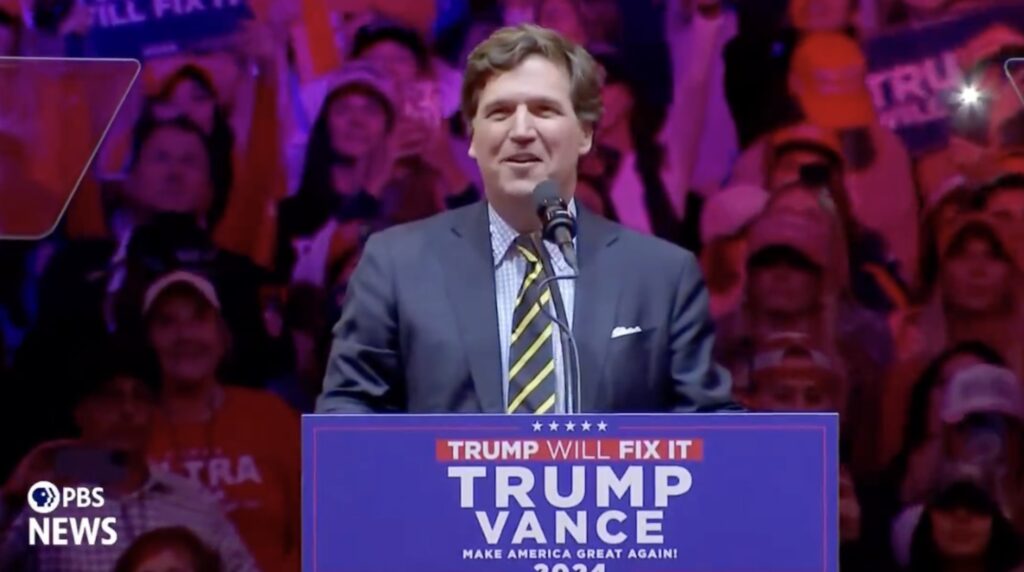At a passionately charged event in Madison Square Garden, conservative commentator Tucker Carlson delivered a compelling speech that energized the crowd and addressed key issues surrounding the current political climate, particularly directed at the Democratic establishment. Carlson’s criticism of the existing political regime was sharp, especially focusing on what he termed an “election fraud” narrative. He characterized his message as a form of “liberation” for Americans who feel increasingly hindered by political correctness and various systemic injustices. Carlson expressed admiration for former President Donald Trump, highlighting Trump’s fortitude in the face of ongoing criticism and attacks by the political elite, while framing his candidacy as a pivotal force that inspires ordinary citizens to voice their opinions on significant matters openly.
The speech was interspersed with personal anecdotes, including a reminiscence about attending a Grateful Dead concert at Madison Square Garden, underscoring the historical significance of the venue for Carlson. He drew parallels between Trump’s resilience and the everyday struggles faced by people who feel marginalized by the current leadership. Carlson depicted a narrative of Trump as a quintessential figure of the New York City identity who, despite facing enormous pushback from local leadership and the elite, returned triumphantly to rally his supporters. This imagery painted Trump as someone undeterred by adversity, likening his return to someone barred from entering a bar only to be cheered on from inside by friends.
Carlson asserted that the disconnect between the political elite and the general populace is palpable. He accused the political establishment of hypocrisy, asserting that their failures stem from a fundamental misunderstanding of why people support Trump. Carlson suggested that the first reason for Trump’s enduring popularity is his genuine affection for the American people, which he described as authentic and unrehearsed, in stark contrast to the insincerity he perceives in other politicians. He recounted his personal experiences with Trump, noting that in their interactions, Trump expressed love for the country and its people. This perception of sincerity resonates with audiences weary of political rhetoric perceived as fake or manufactured.
Moreover, Carlson emphasized another dimension of Trump’s impact, which he identified as a sense of liberation. His notion of liberation centers on the ability to speak truthfully in a climate where political correctness often stifles honest discourse. He argued that Trump’s candidacy has empowered people to reject the status quo, which forces individuals to conform to a narrative filled with lies. Carlson’s argument highlighted the societal pressures that compel people to accept falsehoods, asserting that Trump’s example encourages individuals to openly challenge these narratives. By positioning Trump as a liberating force, Carlson portrayed him as a champion of truth in a landscape marked by misinformation and deceit from the political elite.
Carlson’s rhetoric notably included a sharp critique of those in power, suggesting that their positions were not earned but rather granted through a flawed system that rewards incompetence and mediocrity. He dismissed political figures like Liz Cheney and Kamala Harris as unqualified and emblematic of a system that has failed the nation. His assertion implied that the credibility and authority of political leaders are unfounded and that everyday Americans possess far more value and utility in society. This critique was aimed at dismantling the perceived superiority that politicians hold over average citizens, reframing the conversation around who truly deserves power and recognition.
As Carlson’s speech progressed, the atmosphere in Madison Square Garden grew increasingly enthusiastic, with attendees resonating with his vision of a restructured political landscape, one where the voices and truths of ordinary people would prevail over deception and manipulation. He emphasized the momentum Trump has built ahead of the upcoming election, predicting it would lead to a remarkable shift in public perception and political fortunes. Carlson’s rallying cry projected confidence that Trump’s connectable charisma and authenticity would culminate in renewed electoral success, auguring a future where honesty replaces the perennial lies propagated by politicians. In closing, Carlson expressed heartfelt gratitude to Trump for inspiring a culture of raw honesty, ultimately framing this as a key component of what it means to be liberated in today’s contentious political environment.

